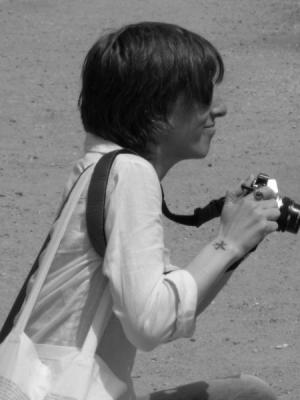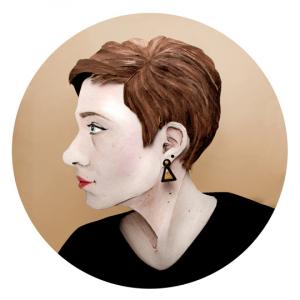Alula, for posterity (autobiography of translation)

Is what is named not already lost? -Albert Camus (tr. N)
He had two rooms on the same floor. -Ingeborg Bachmann (tr. Mary Fran Gilbert)
If a translator stands both before and after, it is in part out of desperation. And so why not, in such an instance, (I mean in an instance in which one is called upon to speak of something when one has no inclination to do so)— state things clearly, if one is to have any chance at all—knowing that chance is full of misgivings, and that wagering on it at all may result in deceitful strategies that may lead one, full of bravura, to declare, and for the record: “I make my own luck.” Setting off a series of dictatorships (fascisms) that move back and forth between the drawing room and the gambling table, the city street and the air strip, incriminating the cinema with its highest (most base) aspirations. It is good to remember that Delphine Seyrig, in L’année dernière à Marienbad, is a broken-necked bird, and the revolver signifies an intention. The phantasm of the stalker is tired and remote, and yet stands at every yawning door, with its perfidious eventuality scripted into the most high-minded of aspirations, in which the most disposable bodies are made to keep silent while inwardly they scream. But do not misunderstand me: the scream emerges eventually, as it did, with persistence, from Michaël Lonsdale’s throat, and by his own admission, he was in fact, the Vice-Consul, in love, with Delphine Seyrig or Anne-Marie Stretter, firing blindly into the sweltering colonial night. (The fish, too, screams. Ingeborg Bachmann, tr. M.F. Gilbert —“: here, I can feel it right here.”—“, he had wanted to shoot it [the cernia] in the back of the neck.” And the camel (Franza), and so on.)

“Who shouted out of me?” (Bachmann, tr. M. Bullock) A translator is equally capable of screaming, but it is not for the usual reasons of hidden names and relegation. At times one wishes to be relegated and to avert prominence without abandoning one’s responsibilities: I mean to meet a person there. To travel that distance along a shrieking rail line beneath an overwrought sun, with one’s eyes full of sweat and cramps in one’s stomach, only to sit and listen with both ears and the full extent of the organ of one’s perforated skin, to enter the vibrations of a low speaking voice, and to know that whatever one’s efforts, the words will seep through the available membranes adopting various forms of distortion that cannot be carried back with one’s hands, nor can they be confided to another. One might well aspire to be “intelligent and mute, contained and revolted” (René Char, tr. N.), but the muteness in question is one that cannot be explained or gratified with recognition. The necessary motions (it seems to me) are down and in and not up and out.
And if this recourse to antonyms seems overly simplistic for this age of obfuscation, I refer you to an early essay by Albert Camus, which appears in L’Envers et l’endroit (1935-1936), specifically the one titled “Entre oui et non.” This one because it may be, that having only read L’homme révolté in English, and with the various accommodations made to the text, the extremities of this language may have escaped your reading ear by virtue of their attenuation. (The painter loved the word attenuate, he used it at every turn, by which I mean often, and ever more often to mean its opposite, augment, which he pronounced aug-u-ment, which was both charming and confounding, since something sinister had seemed to enter the word there, in the manner, perhaps, of an unguent—something oily and not quite pleasing to the ear, presented as a salve, but potentially full of poison—a sort of sea urchin in language, which, when admired at a distance is much preferable to its needles projected into one’s skin, though it would never occur to one to kill it). On the matter of “oui” and “non,” which is given short shrift in L’homme révolté, where it appears under the guise of “the affirmative” and “the negative,” one senses an immediate form of apology, extended well beyond the sorts of niceties to which a translator may be inclined to conform. Which is of course obedience to a form of tyranny, the origins of which remain unclear but are certainly traceable to the apprenticeship of every manner of hypocrisy on which social contracts are written into and including those that lead quite virtuously to murder (not incidentally a question that preoccupied the author of these works until his death, and cost him, of course, the friendship of his greedy little peers, who preferred, as do most private hunting grounds, the privilege of the kill). Camus writes, at the close of “Entre oui et non”: “Don’t let them say about the man condemned to death: ‘He is going to pay his debt to society,” but “They’re going to chop his head off.” (Tr. E.C. Kennedy)
Translation is a name by which a work falls into competition with itself.
I had not wanted to speak of any of this. It is not that the I is hidden, but it is entitled to its reluctance. A reluctance to invoke an incontinent memory abandoned to a present whose calculated imperviousness is a menial form of survival. For the sake of its own oblivion, it doesn’t repeat itself. And what this makes of time is just as pernicious as the various itineraries mapped onto it. I suppose one could write an autobiography of translation, that would have, of necessity, to account for the blank overlays. I don’t see how it could be done otherwise, and with so many cans of film sitting at the inflamed bottoms of the oceans. Could you hold your breath that far I wonder? Any given indication would be misleading. Because translation in itself is a breach of conduct. (In 2003, I fell asleep in Frankfurt, between Montréal and Ljubljana; the assigned waiting area matched the number on my boarding pass, but it was another traveller who, having seen me alight from the same flight, woke me in the midst of the empty room because the gate number had been changed at the last minute. This is exactly what I am talking about). Good intentions, etc. One such itinerary might extend from Dany Bébel-Gisler (Léonora) all the way to Kafū Nagai, with a brief excursion to the northern edge of the African continent, I mean by boat, of course, among the astragalus and the gabians (genus: larus) of the limestone islands, I mean out of reach of the continent, I mean a stone’s throw from Oran, which, in Berber, is a lion (an ontological emphasis is immediately installed in the sentence), which redirects me implacably to Lyon, and so on. Geography provides an utterly unreliable transcript of one’s displacements, preferring the haphazard vectors of emotion, which enable one to imagine a place to be beautiful (the light in Antibes, or the crowded medinas of Marseille) when in fact the bathroom ceiling is leaking brown water into the shower, and at the bottom of the hill in the rain, the squid is already being strangled: it is too late. The bulls, too, are screaming, in the empty arenas of Arles where the feria is eternal and eternally condemnable until such time as the human is rendered extinct. Of course the river (Sumida) is as important as the purchase of a hat. Bearing in mind that in the course of waiting (expectation), nothing really happens.
The few radiographies I have been able to produce reveal the startling existence of a feather deemed (by ornithologists) to be superfluous (I have not gone so far as to determine an equivalency between it, say, and the appendix—appendices have long proved useful if not altogether illuminating for close readers, or, for that matter, again, so-called and very much misattributed wisdom teeth, not to mention adenoids, etc.). My own topographies escape me. . . But it is possible that I might adopt the alula as metonym. (Métonymie: mental disorder characterised by the incorrect usage of words.) If it is indeed superfluous, unlike the furcula (“wishbone”), instigator of the beating wing, then alula is the name by which I falls silent.
—Nathanaël
July 2017
Recommended
Nor’easter
Post-Op Appointment With My Father
Cedar Valley Youth Poet Laureate | Fall 2024 Workshop



 Nathanaël is the author of more than thirty books written in English or in French, and published in the United States, Québec and France. Recent works include
Nathanaël is the author of more than thirty books written in English or in French, and published in the United States, Québec and France. Recent works include 


